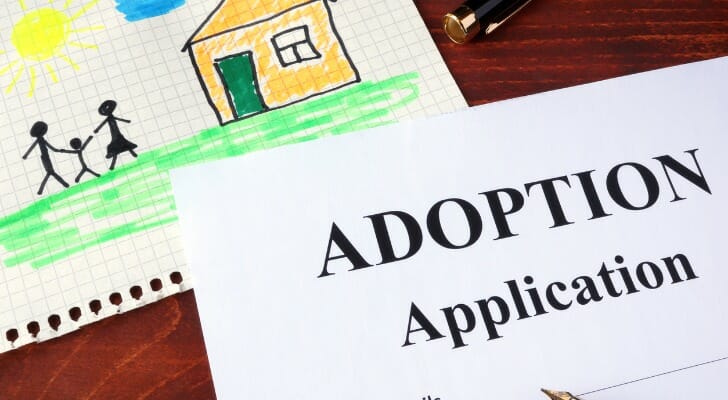 Adopting a child is one of the greatest acts of love a person can do. It gives a warm and secure home to children who need it. But it’s also a full commitment that comes with a range of challenges. From wait times to thorough vetting processes, adopting is no walk in the park. Still, a journey begins with a single step, finding out what’s involved. Here is what you need to know if you want to adopt a child in Florida. Consider working with a financial advisor as you weigh the costs of adopting.
Adopting a child is one of the greatest acts of love a person can do. It gives a warm and secure home to children who need it. But it’s also a full commitment that comes with a range of challenges. From wait times to thorough vetting processes, adopting is no walk in the park. Still, a journey begins with a single step, finding out what’s involved. Here is what you need to know if you want to adopt a child in Florida. Consider working with a financial advisor as you weigh the costs of adopting.
How to Start the Adoption Process in Florida
Most prospective adoptive parents start at the same place. They know they are prepared to adopt, emotionally and mentally, but they don’t know how to begin.
First, it’s vital to examine your situation. Ask yourself whether you and your possible partner are in the position to welcome a child into your life. You will likely find out if you are suited based on your state’s requirements. Florida generally has similar rules to its fellow states, but research will help ensure you are a good candidate. According to Kids First of Florida, you can adopt if you meet the following criteria:
- Are age 21 or older
- Are financially stable
- Have completed all necessary background checks
- Have committed to the child’s care
- Have an appropriate space for the child
- Have completed all required training
Florida has no restrictions on martial status — adoptive parents can be single, married or divorced — and the state allows for adoptive parents to be part of the LGBTQ+ community.
You can find out more through the Child Welfare Information Gateway in its State Statutes Series. But it takes more than acceptance based on who you are. You also need to move through a series of steps. Each part of the procedure helps your adoption agency and caseworker decide if you are an appropriate choice. There are several parts to this process when you adopt in Florida, including:
- MAPP training – MAPP (Model Approach to Partnerships in Parenting) is a 10-week preparation course for prospective foster and adoptive parents. During it parents review their childcare skills, teamwork skills and ability to meet an adopted child’s needs.
- Background checks on a local, state and federal level – Everyone in the household 13 and older must go through a round of background checks.
- PRIDE training – PRIDE (Parents’ Resources for Information Development Education) is a required training course. Your community based care agency will need to complete either PRIDE or MAPP training.
- A current physical exam – Part of the homes study, you need a health statement signed by your health professional (Florida does not discriminate on the basis of disability).
- A home study – A caseworker comes to your home, whether you own it or rent it, to see if it’s safe. They interview each family member on subjects like lifestyle, childcare experience and medical history. The caseworker may have you make updates to the home if there are any hazards. You will also complete paperwork during this time.
From making it on to a waiting list to bringing your child home, everyone’s experience is different. Road bumps like misfiled paperwork can also extend your timeline. However, prospective adoptive parents can typically expect to complete the process in eight to nine months.
How Much Does it Cost to Adopt in Florida?
The cost to adopt isn’t universal. It all comes down to factors like the agency you work with and the type of child you want to adopt. For example, an infant will result in a larger expense than when you adopt an older child. Some of the expenses an adoptive parent may face include:
- Necessary living and medical expenses for the birth parents (during pregnancy and up to six weeks postpartum)
- Service fees, like investigator fees, the home study and home investigation
- Legal expenses, such as court costs
- Medical records and birth certificates
- Advertising
- Professional fees, such as counseling
While an agency can cost upwards of $50,000, some adoptions cost little to nothing at all. If you adopt a child from one of Florida’s 20 community-based care agencies, then you will not be charged for the adoption or receive fees related to the placement, home visit or pre-adoptive training. You may still face non-recurring expenses such as legal fees or the birth certificate fee. However, you can get these reimbursed.
Florida also regulates adoption costs, and court approval is required if any expenses exceed these limits:
- $5,000 in legal fees
- $800 in court expenses
- $5,500 in medical bills
Allowing families of various financial backgrounds the opportunity to adopt is important. The Adoption Assistance Program helps specific children find a safe home through financial help. The child must meet one of the following criteria:
- Is 8 years of age or older
- Is developmentally disabled
- Is emotionally or physically handicapped
- Is part of a sibling placement
- Is black or biracial
You can receive a monthly maintenance subsidy if you adopt an eligible child. The subsidy continues until the child’s 18th birthday, with a possible extension until his or her 21st. Under Florida code 65C-16.012, you can receive medical expenses assistance, Medicaid Services for your child and reimbursement for non-recurring fees (up to $1,000). All of these are subject to adopting a child through the state. The monthly payment is currently up to $417 per month.
People who adopt may be eligible for some tax relief. Florida does not offer a state-level adoption tax credit, but there is still a federal level one. The adoption tax credit is nonrefundable and can help mitigate costs when adopting an eligible child (outside stepparent adoptions). The maximum amount per child for 2021 is $14,300. Research your financing options ahead of time to see other ways you can save.
Also, thanks to section 1009.25, F.S., children adopted from Florida’s state care are eligible for free college tuition. If they attend any Florida state university, vocational school or community college up until the age of 28, they can attend for free.
Do I Need a Lawyer to Adopt in Florida?
 There is no federal or state-level law that requires a lawyer to adopt. Still, adoption is a legal process. Hiring a professional in the field who understands the procedure and laws will help ensure everything goes well. Adoption lawyers study family law on both a state and federal level. So, they can walk you through each part of the legal process. Many adoption agencies connect families with attorney services, which is included in the overall fees.
There is no federal or state-level law that requires a lawyer to adopt. Still, adoption is a legal process. Hiring a professional in the field who understands the procedure and laws will help ensure everything goes well. Adoption lawyers study family law on both a state and federal level. So, they can walk you through each part of the legal process. Many adoption agencies connect families with attorney services, which is included in the overall fees.
However, some choose not to use an agency or want to hire their own attorney. A few firms to start your search are:
- Jeanne T. Tate, P.A. (Merritt Island, Naples, Orlando, Tampa)
- Tammi J. Driver (St. Petersburg)
- Law Office of David M. Goldman PLLC (Jacksonville, Ponte Vedra Beach)
- Florida Adoption Law Group, P.A. (Boca Raton, Fort Lauderdale)
The Florida Bar also has a database of adoption law certified lawyers you can search through.
Type of Adoptions
According to the Florida Bar, four types of adoption exist in Florida:
- Entity adoption – An agency or other intermediary facilitates the adoption.
- Stepparent adoption – A child’s stepparent legally adopts him or her.
- Close relative adoption – A family member outside the child’s parents adopts him or her.
- Adult adoption – An individual adopts a person 18 or older. This is the only one that does not require consent from the legal parents.
Each one has a unique list of procedures and requirements. Some are simpler to accomplish than others, though. For example, Florida uses looser restrictions with adult adoptions than ones that involve minors.
When prospective adoptive parents choose to adopt a child through an agency, they can decide who is involved. There is open adoption, which allows you to stay in contact with the birth parents. Both they and the adoptive parents decide how much they want to interact and whether the child will meet the former.
Semi-open adoption is similar but usually a bit more restrictive. You may still exchange contact information with the birth parents and send updates, like videos or holiday cards.
Lastly, closed adoption is confidential. In this case, the birth family will have no contact with you. However, you and the birth parent can authorize the release of information.
How to Select an Adoption Professionals and Services
The DCF (Department of Children and Families) has a full list of Florida-based Licensed Agencies available for download. Researching your options is crucial. The agency you choose will impact the success of your adoption process, the cost and more. So, weigh the benefits and drawbacks of each service before choosing. A few things you may want to consider during your search include:
- Availability – What are the working hours of your agency? Do they have a 24/7 line in case of emergencies?
- Credentials – Do you trust your agency? Can you find reports that tell you its inspection history? Does it have all the proper licensing?
- Expenses – What is the estimated cost for your type of adoption? Does the agency use a particular fee structure? Do you see any reviews that talk about hidden fees?
- Experience – What is the agency’s reputation? Does it have a long-standing history and trained staff? Are there any references available?
- Guidance – Does your agency or caseworker provide you with support services or optional training courses?
Finalizing the Florida Adoption – Home Study
Home studies are par for the course in the adoption process, whether you choose a private agency or adopt through the state. At the time, a caseworker will schedule a visit to your home, where they will go over your situation with you. Home studies are designed to determine if your household is ready to accept new members. Some of the process includes:
- Interviews
- Background checks that look for a criminal record or presence on a central abuse registry
- Proof of income and financial stability (like financial statements, Social Security information or pay stubs)
- Assessment of the home’s safety
- Documentation of required counseling and education
- Completion of adoptive parent training
Florida also requires a minimum of five written references, according to Considering Adoption. At least two of these must be from non-relatives. All of these steps are necessary for you to be approved and everyone gets involved. All household members above age 12 need to pass the background check. The caseworker may interview every member as well.
In Florida, typically, a licensed professional or a licensed child-placing agency conducts the home study. If none is in your area, then the DCF will step in to do it.
If you are looking for home study providers, here are two options: American Adoptions of Florida and The Adoption Authority.
They also vary in cost. Families should prepare to pay at least $1,000 and up to around $3,000.
Matching with a Child
If a family’s pre-approval process goes well, then you will land on a waiting list with other families. DCF hosts recruitment activities you can attend, like picnics, along with foster children available for adoption. Once your caseworker calls you or you find a child you are interested in taking in, you work with their foster family or social worker.
According to Gift of Life Adoptions, a private, licensed, Florida adoption agency, it currently takes an average of 6 to 24 months for families to find matches. However, this probably changes depending on the agency, the type of adoption you want, etc.
Florida is a unique state, though. It requires the consent of any child over the age of 12. The court sometimes overlooks this if it believes the adoption is in the child’s best interest.
Finishing the Adoption
 Adoptive parents cannot finalize their adoption immediately. They have to wait 30 days after the judgment that terminated parental rights. Or, alternatively, after the child’s placement in the home lasts 90 days. It depends on whichever option occurs later. Sometimes these wait times are shortened, though, if the situation fits. For example, stepparents, close relatives and those adopting adults can finalize their adoptions as soon as they want.
Adoptive parents cannot finalize their adoption immediately. They have to wait 30 days after the judgment that terminated parental rights. Or, alternatively, after the child’s placement in the home lasts 90 days. It depends on whichever option occurs later. Sometimes these wait times are shortened, though, if the situation fits. For example, stepparents, close relatives and those adopting adults can finalize their adoptions as soon as they want.
The official moment is at the final hearing. Adoptive parent(s) must attend unless extenuating circumstances occur. In that case, they phone in with a notary. At that point, if all conditions are met, the judge signs a final judgment of adoption. This gives the adoptive family their parental rights.
The DCF administers post-adoption services in Florida. Whether you obtain these services through the DCF or an agency, they usually include:
- Information and referral
- Optional support groups
- Access to adoption-related libraries
- Training
- Case management
The DCF provides sources for post-placement Florida adoption support groups.
It’s important to note that the DCF maintains the Florida Adoption Reunion Registry (FARR). Birth parents choose whether they will be on it at the time they sign the consent for adoption. If they elect this, then the child can learn their identity after they hit age 18. It’s up to the child if they want to contact the parent at that time.
The Takeaway
Adoption can feel like a long haul. But while every step takes time, it brings you one day closer to your future child. That, on top of how busy you’ll be, can actually make it seem fast. With that in mind, you don’t want to be taken off guard. And the last thing you need is a setback because you don’t have your finances in order. Therefore, consider speaking with a financial advisor. They can help you get all the necessary paperwork together and prepare you for the road ahead.
Tips for Adopting in Florida
- Even though adopting through the state is low-cost, you still need financial stability. Consider creating an investment portfolio to increase your income. Our investment calculator can help you track your money’s growth, helping you to work toward your goals.
- Adoption agencies approve families with financial stability. That doesn’t mean you need excess wealth. You just need to be in control of your finances and have a regular income. That way, you can provide for the child. With a financial advisor, you can take charge of your situation, erase debts and improve your savings. Finding one is simple with SmartAsset’s free matching tool. It shows you up to three financial advisors in your local area. If you’re ready to match with a financial advisor, get started now.
Photo credit: ©iStock.com/xijian, ©iStock.com/designer491, ©iStock.com/Image Source